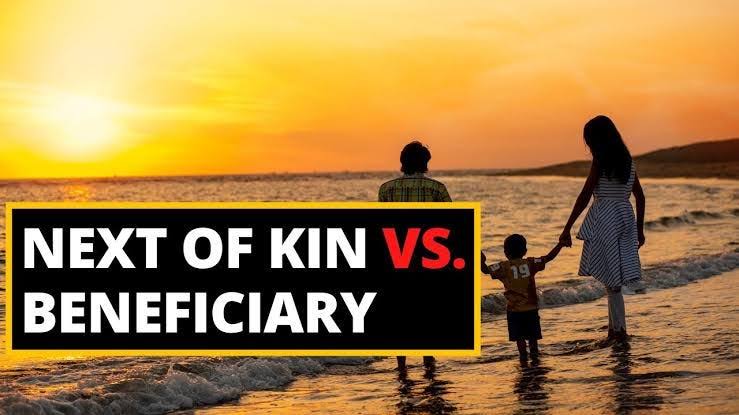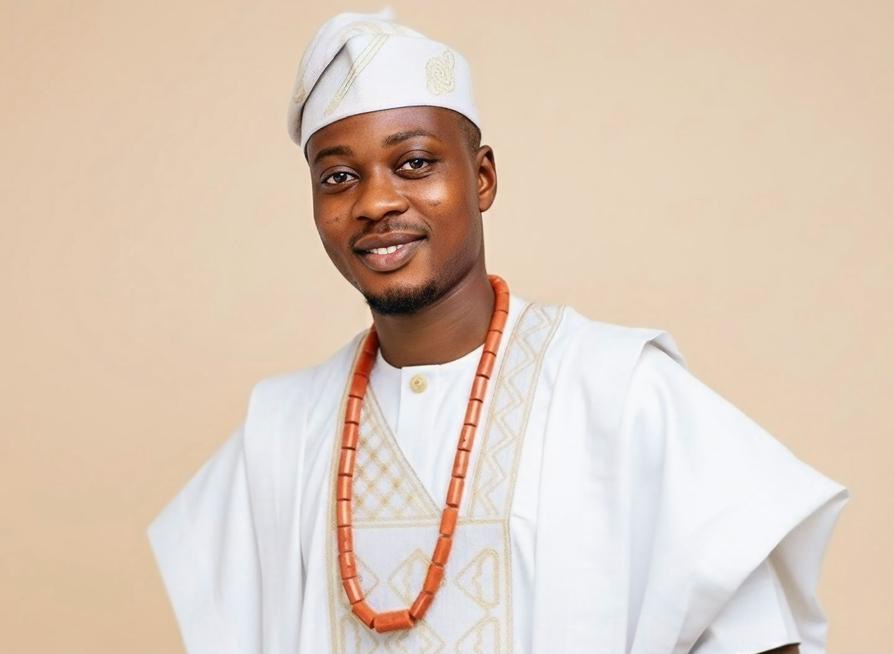Lifestyle
Why Next Of Kin Can’t Access Funds After Account Owners’ Death – Lawyer

Lagos-based legal practitioner and Principal/Founder, Muhammed Adam & Associates, Muhammed Adam, speaks to VICTORIA EDEME on issues associated with writing a will
Can you explain the importance of having a will?
There are so many advantages to having a will. It is important for everyone, particularly those with assets in different parts of the country or worldwide. It becomes important for the person to take inventory of all their assets. Experience has shown that many people acquire property without a will, their family members do not know what they own while they are alive. So, a will helps the testator, the maker of the will, take proper inventory of their assets.
Under native law and custom, you can’t give your property to people who are not related to you. However, when you desire to give your property to non-relatives, a will can help you do so. Due to the nature of conflicts that have arisen in the past over the distribution of assets, the making of the will can easily resolve such disputes because it (a will) states who is to get what and what should be given to whom. In Nigeria, there are some native laws and customs that apply to inheritance. With the making of the will, there is a limit to which these native laws can apply to the distribution of assets. In some parts of Nigeria, women do not inherit property, or the first child is limited to certain properties. However, the making of the will reduces the impact of customary law on some of these assets.
What are the key components that should be included in a will?
There are four key components in a will. Firstly, a will must identify the testator i.e. the maker of the will and owner of the assets. The will must contain the full name, address, and age of the testator. Secondly, a will must clearly show who the executors are. Executors are people who will administer the will when the testator is no longer alive. Their names and addresses must be stated. Another important component of the will is the details of the beneficiaries. The beneficiaries are people who will inherit the properties of the testator after death. Also, the details of the property belonging to the testator must be stated in the will.
The testator must also state properties that do not belong to them. For example, you may entrust your property to my care as a lawyer. So when I’m writing my will, I need to state who such property belongs to. There is a saying that ‘you cannot give what you don’t have’. If a property does not belong to the testator, he cannot will it out. Also, the signature of the testator is very important because it validates the making of the will. A will without the testator’s signature is as good as a worthless piece of paper. The law requires that the signature must be in the presence of witnesses. If the witnesses are not present when the testator is signing the will, that will is not valid. These are the important components of a proper will.
Are there any legal requirements or formalities that must be met when drafting a will?
One of the requirements of a will is that it must be in writing. A will cannot be in oral form. The age of the testator is also a legal requirement. Under the law, you cannot make a will when you’re less than 18 because you’d be considered a minor. Even though a minor can acquire a property, a minor cannot give out a property. Signatures of the testator and witnesses are legal requirements. The date is also a legal requirement because a will is ambulatory, as it takes effect after the death of the testator. It is valid when the date of the will precedes the date of death. But if the date of death precedes the date of the will, it is invalid.

What happens if someone dies without a will?
When someone dies without a will, the person is said to have died intestate. But when someone dies with a will, the person is said to have died testate. If someone dies without a will, their property is subject to the estate law of their state of residence. The will subdues the effect of customary law and Islamic law. For example, if the person who dies without a will is a Muslim, the Islamic personal law will be fully activated. If the person is subject to native laws and customs, the customary law of that person will be fully activated.
Does this mean that the will supersedes customary and religious laws?
It supersedes them to the extent that it allows the testator to decide on how to distribute their properties and to also give people who are not related to them. Under Islamic law and customary law, there is a list of people that you can only give your properties to. There is an order that you must follow. There is a percentage that you must give to your child, father, daughter, mother, or surviving spouse under native law and custom. For instance, when a man is subject to customary law, and the person dies, the first child is the only child entitled to live on the property that the man was living on when he was alive. If he dies intestate, the customary law will be fully activated.
If the person is neither a Muslim nor someone subject to customary law, what applies is the administration of the estate law of that state. If the person is married under the statute, i.e. when they did the marriage in a registry or a licensed place of worship, certain people would apply for a letter of administration. So, the person that is number one, for instance in Lagos State, under the administration of its estate law is the surviving spouse, followed by the children, mother of the deceased, father of the deceased, uncle of the deceased, brothers, and so on. But the point is that if someone dies without a will, you apply for letters of administration. The letter of administration is a document that allows a third party to administer the estate of a deceased person.
The letter of administration can only be given to at least two people. The people that can apply for it are the surviving spouse and the children. If the surviving spouse is not alive, then the children, at least two of them who are above 18 years, can apply. If there is nobody like that, then it goes down to the mother of the deceased and so on. To enable those survivors to transfer or acquire those properties, they must get a letter of administration. Otherwise, they will not be able to get it. And this includes having access to bank accounts, having access to the pension, cooperatives, shares in companies, and all of that. A letter of administration is an important document that must be obtained when someone dies without a will and they have properties in their name.

How do the next of kin of account holders and pensionable workers get access to the accounts once the holder dies?
By law, a next of kin is someone who is required for information purposes only, i.e. someone who can be reached immediately if the account holders are unreachable. Being a next of kin, however, does not confer a legal right to acquire property or to have access to property or assets, money in an account, pension, and all of that. The obligation of the next of kin is to be able to bring the death of the account holder to the attention of the bank or to the attention of someone who holds the money so that they can recognise whoever comes forward as the owner of the letter of administration. I’ll give you an example. Let’s say you are my next of kin, and I have N20m in a bank. If I die today, your obligation by law is to only inform the bank that this person is no more. The bank will not transfer the money to you because you are just for information purposes.
In a real-life case that I was involved in, a woman was named as next of kin to a successful businessman, who was her husband. She wrote the bank to give her the money in her husband’s account because she’s the next of kin. The bank refused and she went to court. We argued before the court that the fact that she’s the next of kin does not mean that she’s automatically entitled to the money. By law, she still requires a letter of administration to be able to have access to the money. The advantage is that the next of kin may be someone who is disqualified by law from applying for a letter of administration. I’ll give you an example.
If a man now names his friend as next of kin, the friend does not have power, access, or rights to his money and he cannot apply for the letter of administration. But when there is a will, that will should automatically tell you who the money in the account is going to. The bank will work with what the will says concerning who will now have access to the account. But when there’s no will, it will work with the letter of administration. So to ensure that the transfer of wealth is moved to the next of kin, that account holder must have a will that states such.
Can you clarify the role of executors and how they are appointed in the will?
The role of the executor is the role of the administrator. He is the person who will assist the beneficiaries in getting the properties to them. For instance, if you name me as the beneficiary of your will, after death, the administrators need to transfer the property to me. There’s a document that the administrators must give to me as the beneficiary. That document is called assent. It’s only the executors who can issue that document. Before the administrators or the executors can issue assent to me, they must also apply to the probate registry of the High Court of the state to get probate. A document issued to executors or administrators to be able to administer a will is called probate. After the probate has been given by the probate registrar, it is their role again to now issue documents called assent so that the beneficiary can have access to the property. How executors are appointed is at the discretion of the testator. There is no special procedure to it.
Can an executor be a beneficiary too?
As a general rule, no. The reason behind that general rule is so that there is no conflict of interest between being a beneficiary and being an executor. If you are an executor and a beneficiary at the same time, you may want to favour yourself more than other beneficiaries, or you may want to administer the assent faster towards getting the property compared to when you are not an executor and a beneficiary. But the testator, maybe because of their relationship, may name an executor as a beneficiary. For instance, if you name your spouse an executor of your estate, ordinarily that person is supposed to benefit from your estate, even without being an executor. So such a person can be named beneficiary and executor at the same time.
In an instance where the executor is not a beneficiary, what are the benefits that the executor will get?
One of the provisions for executors is how they will be paid. The testator will make provision for how the executors will be paid. If I make a will, and I appoint you as my executor, I may say that the sum of N5m should be paid to you every month during the administration of the estate. That way, you are not benefiting as a beneficiary now. You are being paid for your professional engagement. A lawyer can be an executor. If you name me as an executor in your will, and I’m being paid my professional fee for being an executor, I can’t be said to be a beneficiary of the will.
What options are available for distributing assets if the beneficiary dies before the testator?
If the beneficiary dies before the testator, such assets can go back to the estate. There is something called residual estate, which constitutes undistributed property. In some instances, it can be re-willed to another person, or to the survivor of that beneficiary. If the testator is still alive, he can use his discretion to change whatever he or she wants to change. But normally what happens in this instance is that the property will be re-willed to another person or the survivor of the beneficiary.
How often should a will be updated or reviewed?
A will should be updated if there is any change in your financial situation. It can be when you have a new child, you get married, a beneficiary dies, an executor dies, or there is a change in personal relationship. For instance, I have a son and I’ve made my will. If tomorrow I have another child, I will update my will. A codicil is an amendment made to a will. So you can have an original will and as many wills as possible. But the wiser thing to do is that if there’s a change in financial situation or family relationship, you update your will.
Lifestyle
Ooni Congratulates Prince Adekanmbi As Oniko-Elect

The Permanent Chairman of the Southern Nigeria Traditional Rulers Council (SNTRC), Arole Oodua Olofin Adimula and the Natural Head of the Oduduwa race worldwide, the Ooni of Ife, Ooni Adeyeye Enitan Ogunwusi, CFR, Ojaja II has congratulated Prince Sunday Adekanmbi Olayode Asinloye II on his emergence as the Oniko-Elect of Ikolaje Idiriko Kingdom in Ipokia Local Government Area of Ogun State.
Prince Adekanmbi was elected and formally appointed as the Oniko-Elect on 10th February, 2026, by the Ikolaje Idiriko Council of Kingmakers, following due traditional processes and consultations in line with the customs of the ancient kingdom.
In a press statement issued on Monday and signed by the Director of Media and Public Affairs, Ooni’s Palace, Otunba Moses Olafare, the Ooni described the emergence of Prince Adekanmbi as a testament to divine favour and the collective will of his people.
According to the statement, the Ooni commended the kingmakers for conducting a peaceful and credible selection process, noting that the stability of traditional institutions remains vital to cultural preservation and grassroots development across Yorubaland.
The Ooni urged the Oniko-Elect to embrace humility, wisdom and inclusiveness in the discharge of his royal duties, stressing that the throne is a sacred trust that demands selfless service, integrity and unwavering commitment to the welfare of the people.
He further prayed for divine guidance, long life and a peaceful reign for Prince Adekanmbi, expressing confidence that his ascension would usher in a new era of unity, growth and prosperity for Ikolaje Idiriko Kingdom.
The Ooni also reaffirmed the importance of synergy among traditional rulers in Ogun State and beyond, emphasising the need for collaboration in promoting peace, security and socio-economic advancement within their respective domains.
Signed,
Otunba Moses Olafare,
Director, Media & Public Affairs,
Ooni’s Palace,
Ile-Ife.
Lifestyle
Watch: Trending Video Of Gen. Diya Crying, Begging Late General Sani Abacha Surfaces Online

Former Ogun State Leader, General Oladipo Diya, grovelling at General Sani Abacha’s feet, crying and begging the late Head Of State over the 1997 coup allegation.
Gen. Diya was crossed examined at the Human Rights Violation Commission (HRVIC) on the coup plan 1997 to overthrow Gen. Sanni Abacha. He bluntly denied the fact that he was part of the plan but he admitted he knew about the plan.
He further explained that he was afraid of being killed by the Coup Master Planner if he revealed the plan. He denied pleading with Gen. Sanni Abacha but was shocked to see the video where he truly knelt down before Gen. Sanni Abacha as tendered by the Lawyer.
Gen. Diya Oladipo then was appointed as Chief of Defense Staff. He was appointed Chief of General Staff in 1993 and Vice Chairman of the Provisional Ruling Council in 1994. In 1997 Diya and dissident soldiers in the military allegedly planned to overthrow the regime of Sani Abacha.
The alleged coup was uncovered by forces loyal to Abacha, and Diya and his cohorts were jailed. Diya was tried in a military tribunal and was given the death penalty. pon the untimely death of Abacha in 1998, Diya was pardoned by the late Head of State’s successor, Abdusalami Abubakar.
Below is a leaked video clip
Lifestyle
BREAKING!!! Panic As Tinubu Collapses And Fall In Turkey [VIDEO]

A video has emerged showing the moment President Bola Ahmed Tinubu momentarily tripped during his state visit to Turkey, according to Naija News.
Naija News reports that President Tinubu had on Monday arrived Ankara, the capital of Turkey for a state visit.
According to a statement by the Special Adviser to the President on Information and Strategy, Bayo Onanuga, the visit to Turkiye is aimed at deepening cooperation in key sectors including security, education, social development, innovation, and aviation.
Onanuga noted that the trip follows an earlier official visit to Nigeria by Turkish President Recep Tayyip Erdoğan between October 19 and 20, 2021, which reinforced diplomatic ties between Abuja and Ankara.
During President Tinubu’s visit, both countries are expected to hold strategic political and diplomatic engagements focused on shared interests in finance, communication, trade, and investment.
The programme will also feature meetings between senior government officials from both nations, alongside the signing of several memoranda of understanding (MoUs) covering scientific research, energy, technical cooperation, media and communications, military collaboration, and protocol.
A business forum will be held on the sidelines of the visit, bringing together Nigerian and Turkish investors to explore opportunities for mutual economic growth, the presidency noted.
Members of the President’s delegation participating in the bilateral engagements include the Minister of Foreign Affairs, Yusuf Tuggar; the Attorney General of the Federation and Minister of Justice, Lateef Fagbemi, SAN; the Minister of Defence, General Christopher Musa (rtd); and the Chairman of the House Committee on Defence, Jimi Benson.
Others on the entourage are the Minister of Women Affairs and Social Development, Hajiya Suleiman-Ibrahim; the Minister of Interior, Olubunmi Tunji-Ojo; the Minister of Culture and Creative Economy, Hannatu Musawa; the National Security Adviser, Malam Nuhu Ribadu; and the Director-General of the National Intelligence Agency, Mohammed Mohammed.
Culled from Naija News
-

 Politics2 days ago
Politics2 days agoAssembly Confirms Popular Redeemed Pastor As Deputy Governor
-

 Foreign1 day ago
Foreign1 day agoCabinet Reshuffle: President Sacks Finance Minister
-

 Business1 day ago
Business1 day agoJUST IN: 13 Banks May Shut Down In March As CBN Confirms 20 Safe For Recapitalisation Deadline
-

 Politics1 hour ago
Politics1 hour agoBREAKING: “Serial Disrespect” Sparks Drama As Senate Order Arrest Of Tinubu’s Appointee
-

 Politics1 hour ago
Politics1 hour agoOpposition Leaders Urge N’Assembly To Begin Fresh Electoral Act Amendment
-

 Opinion1 hour ago
Opinion1 hour agoEdo State To Spend N1billion On Armoured Car For Speaker, N4.6billion On Vehicles For Lawmakers




